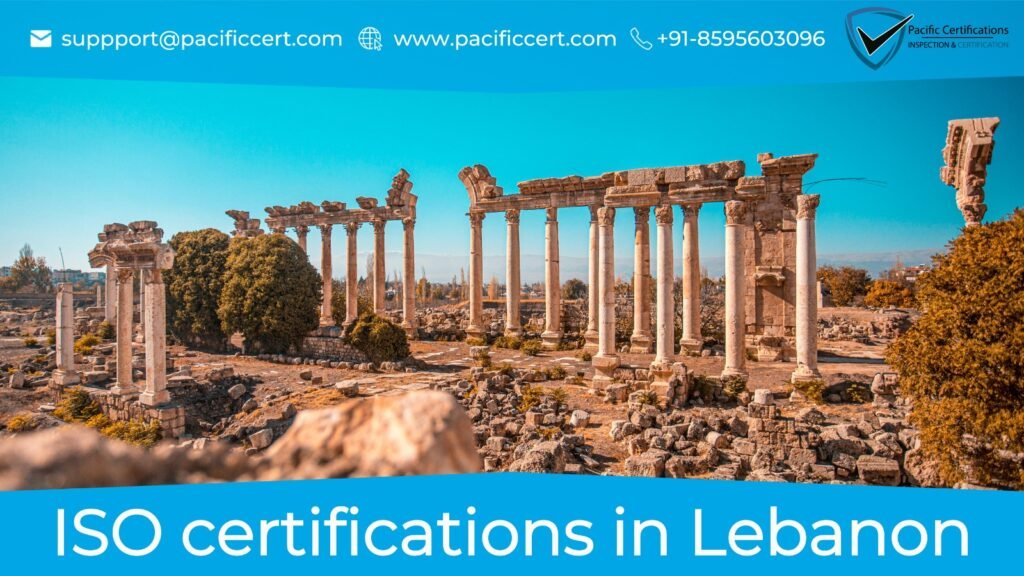
ISO Certifications in Lebanon and How Pacific Certifications can help with Audit
Lebanon, a country with a rich cultural heritage and a growing economy, is increasingly recognizing the importance of ISO certifications to enhance business quality and compliance. ISO certifications serve as a global benchmark, ensuring that companies adhere to international standards of excellence.
As businesses in Lebanon strive to improve their operational efficiency and market credibility, obtaining ISO certifications becomes a critical step.
Applicable ISO Standards for Lebanon
ISO 9001:2015 (Quality Management Systems): Focuses on quality management principles, including customer satisfaction, leadership, and continual improvement, applicable across various industries in Lebanon, ensuring that products and services meet customer and regulatory requirements.
ISO 14001:2015 (Environmental Management Systems): This standard provides a framework for organizations to protect the environment, respond to changing environmental conditions, and improve their environmental performance.
ISO 45001:2018 (Occupational Health and Safety Management Systems): ISO 45001 focuses on reducing workplace risks and creating safer working environments, vital for industries such as manufacturing, construction, and services in Lebanon.
ISO 27001:2022 (Information Security Management Systems): With the increasing importance of data security, this standard helps organizations manage and protect their information assets, ensuring the confidentiality, integrity, and availability of data.
ISO 22000:2018 (Food Safety Management Systems): This standard is crucial for the food industry in Lebanon, ensuring that food products are safe for consumption and meet international safety standards.
ISO 13485:2016 (Medical Devices Quality Management Systems): This standard is designed for medical device manufacturers, ensuring the quality and safety of medical devices.
Click here to find out more applicable standards to your industry
How we can help
We specialize in auditing and certifying organizations against various ISO standards. As a certification body accredited by ABIS, we provide a comprehensive audit and certification process that ensures your organization meets the necessary ISO requirements.
Here’s how we can assist:
- Initial Assessment: We conduct an initial assessment to understand your organization’s current compliance level with the desired ISO standard.
- Gap Analysis: Our auditors identify gaps in your existing processes and provide a detailed report outlining the areas that need improvement.
- Certification Audit: We perform a thorough certification audit to evaluate your compliance with the ISO standard. This includes reviewing documentation, interviewing personnel, and observing processes.
- Certification Issuance: Upon successful completion of the audit, we issue the ISO certification, signifying that your organization meets the international standards.
- Surveillance Audits: To ensure ongoing compliance, we conduct periodic surveillance audits, helping you maintain the certification and continuously improve your processes.
By choosing Pacific Certifications, you are ensuring a rigorous and thorough audit process that will help your organization achieve and maintain the highest standards of quality and compliance!
Contact us today to start your certification journey!
Requirements of ISO Certifications in Lebanon
Obtaining ISO certification in Lebanon requires organizations to meet specific requirements set by the International Organization for Standardization. These requirements ensure that organizations adhere to international best practices in various management systems.
Below is an overview of the general requirements for some of some common ISO certifications in Lebanon:
ISO 9001:2015 (Quality Management Systems)
- Develop and maintain a QMS that meets the standard’s requirements.
- Demonstrate leadership commitment and involvement in the QMS.
- Establish quality objectives and plans to achieve them, addressing risks and opportunities.
- Provide necessary resources, including competent personnel and a suitable work environment.
- Implement processes to deliver products and services that meet customer requirements.
- Monitor, measure, analyze, and evaluate the performance of the QMS.
- Continually improve the QMS through corrective actions and performance evaluations.
ISO 14001:2015 (Environmental Management Systems)
- Develop an environmental policy that reflects the organization’s commitment to environmental protection.
- Identify environmental aspects and impacts, and establish objectives and plans to address them.
- Implement processes to manage and control significant environmental aspects.
- Monitor and measure environmental performance against set objectives.
- Ensure compliance with applicable environmental laws and regulations.
- Conduct regular management reviews of the environmental management system.
- Commit to the continual improvement of environmental performance.
ISO 45001:2018 (Occupational Health and Safety Management Systems)
- Establish a health and safety policy that commits to preventing work-related injury and ill health.
- Identify workplace hazards, assess risks, and implement controls to mitigate them.
- Comply with relevant health and safety legislation and other requirements.
- Set health and safety objectives and plans to achieve them.
- Provide necessary resources, training, and awareness to ensure OH&S effectiveness.
- Implement operational controls to manage health and safety risks.
- Monitor, measure, and evaluate OH&S performance.
- Investigate incidents and take corrective actions to prevent recurrence.
ISO 27001:2022 (Information Security Management Systems)
- Develop an information security policy that outlines the organization’s approach to managing information security.
- Conduct a risk assessment to identify, analyze, and evaluate information security risks.
- Develop and implement a plan to treat identified risks.
- Manage information assets to ensure their security.
- Implement controls to manage access to information.
- Establish procedures for managing information security incidents.
- Ensure compliance with legal and regulatory requirements related to information security.
- Conduct regular internal audits to assess the ISMS’s effectiveness.
- Review the ISMS periodically to ensure its continuing suitability, adequacy, and effectiveness.
ISO 22000:2018 (Food Safety Management Systems)
- Develop a policy that demonstrates commitment to food safety.
- Implement HACCP principles to identify and control food safety hazards.
- Establish PRPs to maintain a hygienic environment.
- Implement a traceability system to track food products throughout the supply chain.
- Establish procedures for responding to food safety emergencies.
- Ensure effective communication on food safety issues internally and externally.
- Monitor and measure food safety performance.
- Commit to the continual improvement of the food safety management system.
ISO 13485:2016 (Medical Devices Quality Management Systems)
- Establish and maintain a QMS that meets the requirements of ISO 13485.
- Implement risk management processes throughout the product lifecycle.
- Control the design and development process to ensure product safety and performance.
- Control production and service provision processes to ensure consistency and quality.
- Plan and develop processes needed for product realization.
- Monitor and measure processes and products to ensure conformity.
- Collect and analyze customer feedback to improve product quality.
- Implement corrective and preventive actions to address non-conformities.
For more information on how we can assist your organization in achieving ISO certification, please contact us at support@pacificcert.com.
Benefits of ISO Certifications in Lebanon
ISO certifications provide numerous advantages to businesses and organizations in Lebanon, helping them enhance their operations, meet international standards, and gain a competitive edge in the market.
Below are some key benefits of obtaining ISO certifications:
Businesses can increase operational efficiency, reduce errors, and minimize waste
- ISO 14001 certification enables organizations to manage their environmental responsibilities systematically
- ISO 45001 Certification helps organizations identify and control health and safety risks, reduce workplace incidents, and ensure compliance with health and safety regulations.
- ISO 27001 helps businesses establish a robust framework to manage information security, protect against data breaches, and ensure the confidentiality, integrity, and availability of information.
- ISO 22000 certification is essential for the food industry in Lebanon. It ensures that food products are safe for consumption by implementing a comprehensive food safety management system.
- ISO certifications help organizations comply with national and international regulations
- ISO certifications are recognized globally, making it easier for Lebanese businesses to enter international markets and attract global clients.
- ISO certifications focus on meeting customer requirements and improving satisfaction.
- ISO standards encourage a culture of continuous improvement within organizations.
- ISO certifications involve employees at all levels in the quality management process.
Obtaining ISO certifications offers significant benefits to businesses and organizations in Lebanon. From enhancing quality and efficiency to improving environmental performance and ensuring regulatory compliance, ISO standards provide a solid foundation for sustainable growth and success.
For more information on how Pacific Certifications can assist your organization in achieving ISO certifications and reaping these benefits, please contact us!
Which industries need ISO Certifications in Lebanon
ISO certifications are beneficial across a wide range of industries in Lebanon, helping organizations meet international standards & enhance quality. Here are some key industries in Lebanon that particularly benefit from ISO certifications:
Manufacturing: Manufacturing companies can significantly improve their production processes, reduce waste, and ensure consistent quality in their products with ISO 9001 certification. This is crucial for both domestic and international markets. ISO 14001 helps these companies implement sustainable practices, reduce their environmental footprint, and comply with environmental regulations and ISO 45001 helps organizations create a safer working environment, reduce accidents, and enhance productivity.
Food and Beverage: The food and beverage industry must ensure that their products are safe for consumption. ISO 22000 certification helps these companies implement comprehensive food safety practices, prevent contamination, and comply with international food safety standards.
Healthcare and Medical Devices: Medical device manufacturers need to ensure the highest levels of safety and quality. ISO 13485 certification helps them meet regulatory requirements and provide safe and effective medical devices.
Information Technology and Telecommunications: Companies in the IT and telecommunications sector handle sensitive data and need to protect it against breaches. ISO 27001 helps them establish a robust information security management system, ensuring data confidentiality, integrity, and availability.
Construction and Engineering: Construction and engineering companies can use ISO 9001 to improve project management, enhance the quality of construction projects, and ensure customer satisfaction. Implementing ISO 14001 helps construction companies manage their environmental impact, comply with regulations, and adopt sustainable practices and ISO 45001 certification helps companies reduce workplace risks, protect workers, and ensure compliance with safety regulations.
Hospitality and Tourism: Hotels, resorts, and other hospitality services can use ISO 9001 to improve service quality, enhance customer satisfaction, and streamline operations.
Education and Training: Educational institutions, including schools, colleges, and training centers, can use ISO 21001 to improve the quality of education, enhance student satisfaction, and ensure effective management practices.
Energy and Utilities Energy companies can use ISO 50001 to improve energy efficiency, reduce energy consumption, and minimize their environmental impact.
Retail and Wholesale: Retailers and wholesalers can use ISO 9001 to enhance the quality of their products and services, improve customer satisfaction, and streamline supply chain operations.
ISO certifications are crucial for various industries in Lebanon, helping them enhance quality, ensure safety, improve environmental performance, and gain a competitive edge. By obtaining ISO certifications, businesses can improve their operations, meet regulatory requirements, and build trust with customers and partners.
Pacific Certifications is accredited by ABIS, in case you need support with ISO certification for your business in Lebnon, please contact us at suppport@pacificcert.com or +91-8595603096.
Read More at: Blogs by Pacific Certifications






